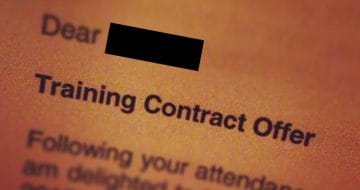Follows Clifford Chance terminating TCs

As the shockwaves continue to be felt from Clifford Chance’s decision to cancel TC offers for several students who failed SQE1, future trainees at Macfarlanes are wondering if they could be next — after remembering that the firm has already committed publicly to a no-resit policy.
Macfarlanes’ graduate recruitment website states that “future trainees are required to pass all SQE exams (including the Macfarlanes essential for practice modules) on the first sitting”. Legal Cheek understands this policy has been in place for some time.
While this approach ensures that potential applicants understand what is expected from them regarding the SQE, it also places additional pressure on students — who are already under significant pressure due to the nature of the assessments — to pass first time around.
There are murmurs that Macfarlanes could row back on its strict ‘must pass first time’ rule. Legal Cheek understands that despite the public statement on the firm’s website no final decisions have been made yet regarding students who may have failed the latest sitting of SQE1.
The Legal Cheek Firms Most List shows Macfarlanes recruits around 33 trainees each year and provides an SQE maintenance grant of £17,000. It sends future trainees to BPP, where the firm also covers training fees.
News of the policy comes just 48 hours after Legal Cheek revealed that Clifford Chance had terminated the training contract offers of around four future trainees who recently failed to pass SQE1 on the first attempt.
Last year, the City of London Law Society proposed several options for law firms to consider regarding trainees who fail the SQE. This included deferrals and rescission of the training contract, but warned the latter could could potentially lead to “negative publicity”.
Macfarlanes declined to comment.
Do you know what approach your firm is taking? Drop us an email at tips@legalcheek.com 📧


